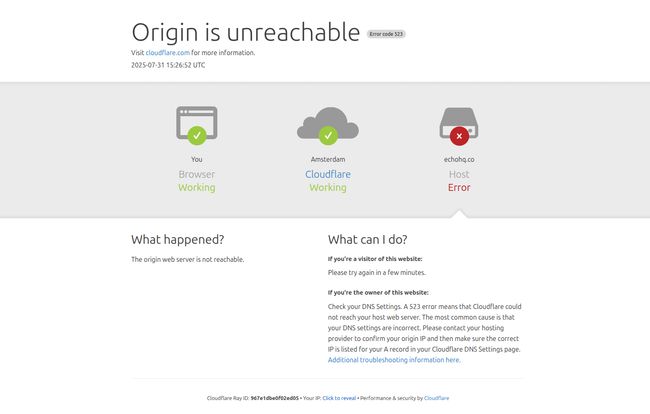We’ve all been there. Stuck in a customer support queue, listening to that awful hold music on a loop, wondering if you’ll ever speak to a real person. Or worse, you’re wrestling with a chatbot that only understands three keywords and keeps asking, “Did that answer your question?” while you’re screaming “NO!” at your screen. It’s a modern-day form of torture.
For years, the promise of AI in customer service has been dangling in front of us like a golden carrot. The idea of smart, instant, 24/7 support that actually helps is the dream, right? It's a space I watch closely, not just for my clients but because I'm genuinely curious about who will finally crack the code.
Which brings me to a platform I'd heard some chatter about: Echo. The name itself suggests a response, a reflection of the customer's needs. It's pitched as an AI-driven platform ready to transform the support game. So, naturally, I went to check it out. And I hit a wall. A big, fat, digital wall in the form of a Cloudflare Error 523.

Visit Echo
Origin is unreachable. Yikes. This isn't just a simple glitch; it's a sign that the server itself is offline. So, is Echo a ghost? A failed experiment? Or just having a really bad day? Let’s talk about what Echo was supposed to be, and what this silence might mean.
What Exactly Is (or Was) Echo Supposed to Do?
Putting aside the fact that their website is currently a digital ghost town, the information I could dig up paints a pretty picture. Echo positions itself as an AI-powered assistant designed to provide immediate, intelligent customer support. Think of it as the ultimate employee: it never sleeps, never gets grumpy, and can handle a thousand queries at once without needing a coffee break.
The core idea is to slash those dreadful wait times and scale on demand. Your business gets featured on a major news site? A traditional support team would be drowning in tickets. An AI platform like Echo is designed to just… expand. It handles the surge, ensuring every customer gets an instant, personalized response. At least, that's the theory.
The Big Promises of AI-Powered Support
The benefits Echo claims are the same ones that make AI in this space so appealing in the first place. It's not just about replacing humans; it's about augmenting them and handling the stuff that drives everyone crazy.
Your Support Team That Never Sleeps
I've worked with e-commerce brands that sell globally. Their customers are in Sydney, London, and Ohio, all at the same time. You can't just run a 9-to-5 support desk anymore. The biggest and most obvious win for a tool like Echo is 24/7 availability. It ensures that a customer in Australia asking about shipping at 3 AM your time gets an answer, not an auto-reply saying, “We’ll get back to you in 24 hours.” That’s a massive competitive advantage.
Scaling Without Breaking a Sweat
Scalability is another huge one. I remember a client who ran a Black Friday sale that went viral. It was amazing for sales but an absolute catastrophe for their two-person support team. They were buried for weeks. AI support is the antidote to this. It doesn't care if it's talking to 10 people or 10,000. It scales effortlessly, which is something human teams simply cannot do without immense cost and planning.
Making It Personal (Theoretically)
Here’s where things get interesting. The promise of a “personalized customer experience” is the holy grail. A well-trained AI can pull a customer’s history, past orders, and previous complaints to inform its conversation. Instead of a generic “How can I help you?” it can start with, “Hi Sarah, I see your last order for the blue widget hasn't shipped yet. Are you asking about that?” That’s a game-changer. It makes the customer feel seen, not like another ticket number.
Let's Get Real: The Not-So-Shiny Side
Of course, for every promise, there's a pitfall. As someone who's seen a few of these platforms in action, I know it's never as simple as plugging it in and watching the magic happen.
The 'Just Set It and Forget It' Myth
The first hurdle is always the setup. The product info mentions it “may require initial setup and integration.” You think? Integrating a new system into your existing CRM, helpdesk, and e-commerce platform is rarely a walk in the park. It takes time, technical know-how, and often, a developer's help. It’s a real cost in both time and money that businesses need to budget for.
Garbage In, Garbage Out
This is probably the most critical point. The effectiveness of any AI hinges entirely on its training data. If you feed it confusing, outdated, or incomplete information from your knowledge base, you’re not creating a helpful assistant. You’re creating a confident idiot. It will give wrong answers with absolute certainty, which is infinitely more frustrating for a customer than a simple “I don’t know.” I once dealt with a travel bot that insisted my flight was on time while the airport departure board was screaming “CANCELED.” That's the risk of poor training data.
The Uncanny Valley of Customer Service
Finally, there's the risk of creating impersonal interations. There's a fine line between an efficient AI and a cold, robotic presence that alienates customers. Some people just want the empathy and nuanced understanding of a human, especially for complex or emotional issues. If your AI isn't programmed with an excellent personality and clear escalation paths to a human agent, it can do more harm than good to your brand's reputation.
The Elephant in the Room: The 523 Error and Missing Prices
Let's circle back to that error screen. A Cloudflare 523 error isn't a minor hiccup. It means Cloudflare (a service that sits between the visitor and the website's server) is working fine, but it can't get a response from Echo's actual host server. In layman's terms, the lights are on, but nobody’s home. For a tech company, especially one selling a 24/7 availability service, this is a massive red flag.
Compounding this is the complete lack of a pricing page or even a hint at cost. This is a personal pet peeve of mine. When a SaaS company hides its pricing, it usually means one of two things: it's incredibly expensive (think enterprise-only contracts), or they aren't confident enough to put a price on their product yet. Given the current server status, you can draw your own conclusions. This lack of transparency is often a sign of a startup that is either still figuring things out or, potentially, struggling.
So, Should You Even Bother with Echo? My Final Take
The idea behind Echo is solid. The features it promotes are exactly what businesses need to compete in today's always-on economy. The promise of scalable, personalized, 24/7 support is not just hype; it's the future of customer experience.
However, I can't in good conscience point anyone toward a tool whose own website isn't even online. It's like a chef recommending a restaurant that has a “Closed by Health Department” sign on the door. Until Echo sorts out its server issues and becomes more transparent about its model and pricing, it remains a curious ghost story rather than a viable business solution.
My advice? Look for the principles Echo stands for in other, more stable platforms. Look for case studies, public pricing, and a service that, you know, actually has a working website.
Frequently Asked Questions
- What is Echo AI?
- Echo is (or was) an AI-driven platform designed to offer 24/7 intelligent customer support. Its main goals were to reduce customer wait times, scale to meet business demand, and provide a personalized experience.
- What are the main benefits of using an AI support tool like Echo?
- The primary advantages are round-the-clock availability for global customers, the ability to handle a massive volume of queries without a proportional increase in cost, and the potential to offer personalized support by integrating with customer data.
- What does a Cloudflare Error 523 mean for a website?
- An Error 523, or “Origin is unreachable,” means that the website’s server is not responding. The problem isn't with your connection or with Cloudflare's network, but with the host server itself, which could be down for maintenance, overloaded, or offline entirely.
- Are AI chatbots better than human support agents?
- It's not about being better, but about being different. AI is excellent for handling high-volume, repetitive, and informational queries instantly. Humans excel at complex, emotional, and nuanced problems that require empathy and creative problem-solving. The best systems use AI as the first line of defense and make it easy to escalate to a human when needed.
- Is Echo still in business?
- Based on its website being unreachable (Error 523) and a lack of recent activity or transparent pricing, its current operational status is highly questionable. It may be temporarily down or could have ceased operations.
- What should I look for when choosing an AI customer support platform?
- Look for a platform with a stable track record (and a working website!), transparent pricing, strong case studies or testimonials, easy integration with your existing tools, and clear pathways for customers to reach a human agent if the AI can't solve their problem.
A Fading Echo or a Future Voice?
The story of Echo is a cautionary tale. A great idea is nothing without execution and reliability. While Echo itself might be silent for now, the concepts it championed are louder than ever. The quest for the perfect AI support agent continues, and for businesses willing to navigate the complexities, the reward is happier customers and a more efficient operation. Just make sure you partner with a provider who can keep their own lights on first.
Reference and Sources
- What is a chatbot? - Cloudflare
- Troubleshooting Cloudflare 523 errors - Cloudflare
- The Three Customer Service Megatrends In 2023 - Forrester



